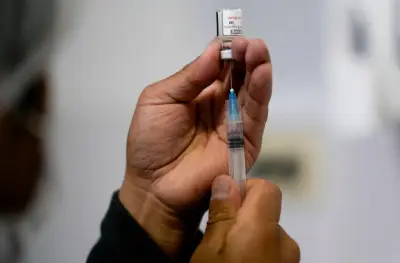Combating vaccine hesitancy through culture and communication

Mahdi Warsama didn’t live in Minneapolis when Andrew Wakefield, former doctor and prominent vaccine critic, shared his message with the city’s Somali community in 2008 and 2011. But Warsama still deals with the consequences. “It comes up every time we give a speech [or] we go to a gathering,” said Warsama, CEO of the Somali Autism Parent Network. Inevitably, he said, someone mentions the debunked link between vaccines and autism. “As an organization, we have to respond.” Mahdi Warsama, CEO of the Somali Parents Austim Network (SPAN). Credit: Courtesy of Mahdi Warsama As communities around the U.S. deal with a 33-year high in measles cases, Warsama said SPAN is considering a more proactive approach to addressing the benefits of vaccination. Public health practitioners in the state are doing the same, particularly in communities where government distrust is high and misinformation has taken hold. A once-eliminated disease resurges About 25 years ago, the Centers for Disease Control declared measles eliminated in the U.S. However outbreaks across the nation have brought the preventable disease back into the spotlight. As of July 15, there have been 29 measles outbreaks in the U.S. Of the 1,309 confirmed cases, 92% of patients were either unvaccinated or had an unknown vaccination status. Minnesota health officials have recorded five cases in 2025, tracking much lower than the 70 confirmed cases in 2024. The state’s 2024 outbreak, as well as an outbreak in 2017, were both linked to and affected unvaccinated children from the Somali community. Under U.S. Health and Human Services Secretary Robert F. Kennedy, federal funds aimed at supporting widespread vaccination have been slashed. “We need more funding, not less,” said Inari Mohammed, an epidemiologist at the University of Minnesota School of Public Health whose research has focused on health equity. The history and misinformation at the root of the challenge In 2023, Mohammed published a paper detailing reasons for vaccine hesitancy among Black women in Minnesota. For those whose ancestors have lived in the U.S. for several generations, the medical exploitation of Black Americans seeded the distrust, according to Mohammed’s paper. Examples included the Tuskegee syphilis study, the harvesting of stem cells from Henrietta Lacks without her consent, the sterilization of black women and experiments conducted on incarcerated people. Inari Mohammed, PhD. Credit: Courtesy of Inari Mohammed For more recent immigrants, Mohammed said that vaccine hesitancy stemmed more often from misinformation. Some participants in Mohammed’s study worried that the vaccine would have a negative effect on fertility. Others cited claims that it contained unsafe ingredients, or was designed specifically to “eliminate Black people.” In Minnesota’s Somali community, a specific piece of misinformation has taken hold: the debunked belief, propagated by Wakefield, that the measles, mumps and rubella (MMR) vaccine causes autism. Mohammed said Wakefield “targeted” the community on his visits to the state in 2008 and 2011. One in 16 Somali 4-year-olds in Minnesota is autistic, compared to 1 in 53 of their non-Somali peers, according to a 2023 study from the Centers for Disease Control and Prevention. Researchers have been unable to point to a definitive cause for higher rates of autism in the Somali community, but the vaccine link has been overwhelmingly rejected. Though Wakefield lost his medical license in 2010, he remains a prominent voice in the anti-vaccine movement. Battling vaccine misinformation with connection Statewide, vaccination rates are on the decline. In 2024-25, about 87% of Minnesota kindergarteners were fully vaccinated against measles, down from 93% in 2015-16. When it comes to combatting misinformation about the vaccines, Mohammed said the messenger is as important as the message. Participants in her study “wanted clear and culturally appropriate communication,” she said. “Communication needs to be in the right language, in the right dialect and in the most appropriate media for a community.” Related: Trusted messengers may help disenfranchised communities overcome vaccine hesitancy Sheyanga Beecher, CNP, MSN, MPH Credit: Courtesy of Sheyanga Beecher Sheyanga Beecher, the medical director of Hennepin Health Care’s Pediatric Mobile Unit, said that events and town hall-type meetings can be an effective place to spread reliable information to vaccine-hesitant communities. “Someone may not trust me but they will trust Imam Sharif, and Imam Sharif will vouch for me and he will be co-presenting with me at the mosque,” Beecher said. She uses these events to share the science of vaccines, including herd immunity, which she explains with an allegory about elephants. When a lion is stalking a herd of elephants, “you’ll notice that the adults will circle around the youngest of the herd. They’ll put the baby in the middle of the herd and create this wall around it because they are aware what the danger is. They know how to defend themselves against the danger, but the baby in the middle is still sort of learning those things,” Beecher said. “There are individuals in our community that may be vulnerable and aren’t able to get the vaccine,” she added, like babies or people who are immunocompromised. “Therefore, those of us that are healthy and can get the vaccine should do so, so that we can protect the vulnerable.” Beecher acknowledges that addressing vaccine hesitancy takes time that health care providers don’t always have. But when the conversations can happen, they provide patients and providers an opportunity for problem-solving and engagement. Ultimately, Beecher said, “the more you talk to families, the more open they are to vaccines.” The post Combating vaccine hesitancy through culture and communication appeared first on MinnPost.

